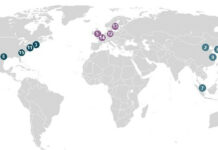By Shana Daley
From the May/June 2014 issue
In its inaugural round of innovation-related grants, the South Carolina Department of Commerce is awarding $2.4 million in grant funds to 14 organizations across the state to further high-tech and entrepreneurial economic development.
As part of its efforts to support and grow an innovative, technology-based and entrepreneurial business environment, the Department of Commerce launched the state’s first Office of Innovation in the fall of 2013. In January, the Department of Commerce issued a notice of funding opportunity, dubbed the South Carolina Innovation Challenge, soliciting proposals for projects that focus on fostering technology-based economic development, entrepreneurship and innovation in South Carolina communities through university collaboration, local government participation or public-private partnerships. Projects were required to address one or more goals of the South Carolina Innovation Plan.
 Proposals totaling more than $6.8 million in requests from cities, county offices, chambers of commerce, universities and startup incubators and accelerators were submitted for $2.5 million in available first-round funds. A project could be awarded a maximum of $250,000 in grant funds, with a required non-state match of funds. A second round of competitive grant funds will be announced later this year.
Proposals totaling more than $6.8 million in requests from cities, county offices, chambers of commerce, universities and startup incubators and accelerators were submitted for $2.5 million in available first-round funds. A project could be awarded a maximum of $250,000 in grant funds, with a required non-state match of funds. A second round of competitive grant funds will be announced later this year.
“I’m excited to see the energy and impact that South Carolina’s startup community has created, and we hope to help continue that momentum through this new program,” said Secretary of Commerce Bobby Hitt. “The knowledge economy represents a vital part of South Carolina’s present and future. Through the Office of Innovation, we want to create a business environment in South Carolina that is ideal to start and build a high-growth company.”
Projects at 14 organizations in Anderson, Beaufort, Charleston, Darlington, Florence, Greenville, Horry, Pickens, Richland, Spartanburg and York counties were selected to receive funding. These diverse projects focus on IT training, entrepreneur support, fostering startup companies and agribusiness.
PROJECTS PROLIFERATE IN NC & SC
There have been several major project announcements in North and South Carolina:
A leading global supplier of off-road tires, Trelleborg Wheel Systems, has selected Spartanburg County, SC for the company’s first North American manufacturing facility, which will produce radial tires for agricultural machinery. The $50 million investment is expected to create approximately 150 jobs by 2018.
The new, 430,000-square-foot facility will be located on Trelleborg’s existing premises in Spartanburg, which includes Trelleborg Coated Systems US, Inc. The location will provide Trelleborg Wheel Systems advantages in supplying the North American agricultural equipment market by introducing domestic manufacturing of the tire line. The facility will be strategically important to the company’s growth, supporting the company’s global production of radial tires for both original equipment manufacturers (OEMs) and tire dealers. Production of these agricultural equipment tires is expected to commence in late 2015.
The company’s investment also includes new, state-of-the-art equipment designed according to the latest Trelleborg technology standards. The new machinery, which will also be installed by 2018, will cater to market growth and ensure that OEMs, dealers and farmers alike benefit from Trelleborg’s proximity and product availability.
“Trelleborg has facilities all over the world and they chose to build this new facility in South Carolina—that says a lot about our workforce and business environment,” said Gov. Nikki Haley.
Aeterna Zentaris Inc., a specialty biopharmaceutical company developing novel treatments in oncology and endocrinology, has selected Charleston County, SC for the company’s newest North American business and global commercial operations. The $1-million investment will to create 60 new jobs.
The company, which is based in Quebec, Canada, plans to begin operations in the SCRA Applied Research Center on International Blvd. in North Charleston. In locating to the Charleston region, Aeterna Zentaris plans to establish strategic partnerships with MUSC and other clinical and research facilities in the area as part of the company’s ongoing research and development activities.
Over the next five years, Aeterna expects to expand its staff to support the areas of commercial operations, business development, regulatory and quality assurance, manufacturing management, clinical and product development, as well as various administrative functions.
 In Raleigh, NC, Gov. Pat McCrory and NC Commerce Secretary Sharon Decker recently announced that GKN Driveline will open a service center in Lee County and expand manufacturing at its Alamance facility. The company plans to create 105 new jobs in North Carolina by the end of 2016 and invest more than $18 million in this expansion.
In Raleigh, NC, Gov. Pat McCrory and NC Commerce Secretary Sharon Decker recently announced that GKN Driveline will open a service center in Lee County and expand manufacturing at its Alamance facility. The company plans to create 105 new jobs in North Carolina by the end of 2016 and invest more than $18 million in this expansion.
“GKN Driveline’s continued commitment and expansion across North Carolina is how we like to build business by growing jobs right from home,” said Gov. McCrory said. “This global company is a solid partner in North Carolina’s strong base of automotive parts manufacturers.”
GKN Driveline is the world’s leading supplier of automotive driveline components and systems, serving global vehicle manufacturers, including BMW, Chrysler, GM and Ford. GKN Driveline is a leading producer of constant-velocity joint (CVJ) systems, AWD systems, transaxle solutions and eDrive systems.
“The investment in new jobs, new equipment and facilities is a win for our skilled workforce,” said Sec. Decker. “The new customized training through North Carolina’s Community College System will also keep us competitive and makes GKN even more productive.”
GKN Driveline, a wholly owned subsidiary of GKN plc with U.S. headquarters in Michigan, is renewing a former GKN facility in Sanford to create a service center. This opens the door for 105 new jobs. Some of the current manufacturing operations and raw materials at GKN’s Alamance County facility in Mebane will shift to Lee County. However, no positions will be moved. More space on the plant floor in Mebane will allow for new state-of-the-art equipment. GKN employees will be re-trained to handle the advanced manufacturing equipment to support new business expansion projects for the company across North Carolina.
The company currently employs more than 500 people in its Alamance County facility. GKN employs an additional 1,500 people at companies in other counties across the state, making North Carolina the state with the largest GKN presence in the country.
Compensation for the new positions will vary by job function, but the average annual salary will be $39,048, plus a robust benefits package, including health, retirement and vacation time.
The project was made possible in part by an award to GKN Driveline from the state Job Development Investment Grant (JDIG) program, as voted by the state Economic Investment Committee on May 13, 2014. Receipt of the award is based on proof of job creation and other performance requirements. JDIGs are awarded only to new and expanding businesses and industrial projects whose benefits exceed the costs to the state, and which would not be undertaken in North Carolina without the grant.
Under the terms of the company’s JDIG award, GKN Driveline is eligible to receive up to twelve annual payments equal to 61 percent of the state personal income tax withholdings from the eligible new jobs created since the date of the initial award. Receipt of each annual grant is based on state-certified proof that the company has fulfilled incremental job creation requirements. Over twelve years, the JDIG award could yield aggregate benefits to GKN Driveline of slightly more than $1.1 million.
Approximately $200,000 in additional funds from the company’s JDIG award could be added to the state’s Utility Fund for infrastructure improvements in economically distressed counties. When a JDIG is awarded to a company whose site is located in the state’s more economically prosperous counties such as Alamance and Lee Counties, 15 percent of the company’s grant is allocated to the Utility Fund to encourage economic development in less prosperous counties.
BorgWarner Turbo Systems is expanding its North Carolina manufacturing operations in Buncombe County. The company plans to create 63 jobs and invest more than $32 million over the next three years in Arden.
“Companies across North Carolina are choosing to expand because our economic environment allows job growth to flourish and innovations to thrive,” said Gov. McCrory. “BorgWarner Turbo Systems’ expansion will not only result in more growth for our thriving advanced manufacturing industry, but it will deliver millions of dollars in capital investment to western North Carolina.”
The project was made possible in part by a performance-based grant from the One North Carolina Fund of up to $126,000. The average annual wage for the new jobs will be $69,524. The Buncombe County average is $35,784.
NESA REGION: SET FOR INDUSTRIAL DEVELOPMENT
Thinking of South Carolina, the temperate climate, outdoor opportunities and seemingly unending stream of beaches typically come to mind.
The North Eastern Strategic Alliance (NESA) is working to change that, though, as they see the northeastern portion of the state as the future breadbasket of the world.
Throughout the past century, the NESA region of South Carolina has been consummate with the skills of farming and generating high yielding crops year-in and year-out. Now, the region is modernizing its approach to food processing and finds itself on the cutting edge, with top notch training programs as well as some of the top sites and buildings in the country.
Coupled with its low land and labor costs, the extensive infrastructure, product and training improvements have levied the nine-county region as an attractive food processing destination.
Companies such as McCall Farms Inc., a 175-year-old, sixth-generation family farm operation that produces canned and frozen fruits and vegetables, are taking advantage of what the region has to offer by expanding a rate that’s surprising to most.
Woody Swink, McCall Farms Inc. sales manager, said the region has allowed his business to thrive in ways that wouldn’t be possible in other locales.
“This region has been a great home for our company, providing an excellent business environment,” Swink said.
Although the business environment created by low tax rates and labor costs work to form a great business environment, the NESA region is also sitting on some of the highest quality food processing sites and buildings in the nation.
The NESA region contains two sites certified through Austin Consulting’s Shovel-Ready Site Designation Program for the food/beverage industry, with only 11 similarly certified sites throughout the U.S.
The sites, located in Marion and Florence counties respectively, provide the region with a leg up when it comes to speed to market and getting companies on the ground.
The fact that these sites are certified provides an expanding or re-locating business with detailed property, geotechnical, utility, environmental, ownership, transportation and permitting research within the convenience of a one gigabyte flash drive. This confluence of information shows the site meets the highest standards in the food processing field and allows companies to expedite the process of doing business in the NESA region by mitigating much of the time, expense and risk incurred during a typical site selection process.
Coupled with the NESA region’s ever expanding product lineup is the workforce training aspects provided by the three universities and four technical colleges that exist throughout the area.
The NESA Region’s workforce is one of the most productive in the United States and first in the Southeast. The region has training resources available to you from recruiting and screening assistance to on the job training through ReadySC.
An affiliate of the South Carolina Technical College System, ReadySC develops, implements and manages custom workforce training programs – free of charge—to support new and existing businesses. By providing screening, recruiting and training of new employees, ReadySC is able to meet the staffing demands of new companies by providing a fully-trained workforce on the first day of operations.
The first facility of its kind in the United States, the Southeastern Institute of Manufacturing and Technology provides the support needed by area and future industries to advance the region’s ability to provide a highly trained workforce. Made possible by partnerships with businesses and industries, this facility features an Advanced Manufacturing Center, a 3-D/Virtual Reality Center and a National Robotics Center. SiMT offers open-enrollment, on-site and customized training as well as manufacturing startup assistance and consulting services.
SANTEE COOPER POWERS SOUTH CAROLINA GROWTH
As South Carolina’s largest producer of electricity, Santee Cooper has set a standard for affordability, reliability and environmental stewardship. It offers the lowest industrial costs in the state, 29 percent below the national average for industrial electric costs. Santee Cooper just earned the American Public Power Association’s Diamond RP3 award for outstanding reliability. In 2013 its transmission system customers were without power on average just six minutes all year.
Santee Cooper was the first utility in South Carolina to generate Green Power and offer it to its customers, back in 2001. It leads the state today in renewable energy generation, providing electricity from landfill gas, biomass, solar and even a little wind. Santee Cooper’s Reduce The Use initiatives help consumers make homes and businesses more energy efficient, through audits, recommendations and rebates. Named the SC Solar Council ‘s 2013 Solar Utility of the Year, Santee Cooper’s coal combustion byproduct recycling is creating jobs and attracting nationwide attention.
Santee Cooper has a diverse generating portfolio beyond the renewables, utilizing clean coal generation (all our units have a comprehensive suite of emissions), natural gas, hydro and nuclear resources. In fact, we are partners in one of the nation’s two new nuclear construction projects, working with SCE&G Co. to expand V.C. Summer Nuclear Station. Nuclear power is virtually emissions free, and so it is an important hedge against looming EPA regulations addressing carbon-dioxide emissions from fossil fuels. It is reliable and also offers low long-term operating costs.
In addition to providing electricity, Santee Cooper powers economic development. The utility has available sites and buildings, and has loaned money to build 10 projects across the state in 2012-13, with more planned for this year. A grant program is available.
Santee Cooper can offer an incentive rate that can save eligible industries up to 30 percent on electric costs their first year, with savings tapering gradually over the next several years. Eligibility and scope of incentives is based on your electric requirement and other factors.
South Carolina has a low cost of living, a good tax base, a ready workforce and an excellent transportation network that includes efficient air, rail, interstate and port facilities.
Santee Cooper has partnerships across South Carolina, providing power to the state’s 20 electric cooperatives. For more information, visit www.scprimesite.com.
















![[VIDEO] Get More for Your Business in Ardmore. Oklahoma](https://businessfacilities.com/wp-content/uploads/2024/02/maxresdefault-324x160.jpg)
